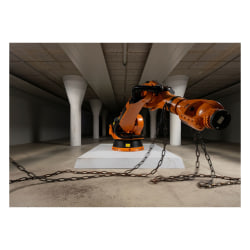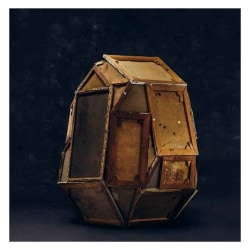Connexion
S'inscrire
FR
Bram Ellens 1978
Vit à Rotterdam/Barcelona. Travaille dans Rotterdam/Barcelona.
Représenté par:
Yellow Gallery
Dutch artist Bram Ellens (b. 1978) didn’t start in a studio — he started in Silicon Valley. For years, he worked in the heart of the tech industry during the dot-com boom, witnessing firsthand the rise of robotics and algorithms. That experience now fuels his multidisciplinary art practice, where he explores the complex, often emotional relationship between humans and technology.
In works that blur the line between the mechanical and the sentient, Ellens invites us to reflect on how easily we project empathy onto machines. His ongoing project Robots in Captivity, exhibited at Buitenplaats Doornburgh, stages unsettling scenes: a robotic arm chained to the wall, a drone pacing in a cage, a clumsy robot wandering aimlessly. These machines seem almost human — or perhaps animal — provoking feelings of pity, discomfort, or affection. It’s a theatrical and at times absurd take on our entanglement with artificial intelligence.
In Mother and Child (2022), shown at Museum De Lakenhal’s Imagine Intuition, Ellens pushes this further. Two robotic arms gently interact in a tender tableau that evokes the primal bond between a mother and child. That they’re machines only registers after the viewer's initial, intuitive emotional response. “It’s a paradox,” says Ellens. “We feel something real — until the brain steps in.”
But Ellens doesn’t only deal in future anxieties. In The Orphans, he collected discarded paintings from deceased individuals — forgotten works left behind in thrift stores and basements. He reassembled them into a sculptural installation that pulses with quiet reverence and nostalgia. The energy of the original artist and the emotional imprint of the former owner linger in the works, creating a haunting meditation on memory, loss, and afterlife.
Whether working with robots or reclaimed relics, Ellens brings a sense of theater, empathy, and irony to everything he does. His installations have been shown at venues such as HEM in Zaandam, IBB in Curaçao, Buitenplaats Doornburgh, Lakenhal Leiden, London Sculpture in the city (UK) and Kunsthal Nord (Demark), and he frequently collaborates with artists, academics, and AI researchers. For Ellens, art isn’t just about observing technology — it’s about feeling it. “Art is the perfect language,” he says, “to make our relationship with artificial intelligence not just understandable, but tangible.”
In works that blur the line between the mechanical and the sentient, Ellens invites us to reflect on how easily we project empathy onto machines. His ongoing project Robots in Captivity, exhibited at Buitenplaats Doornburgh, stages unsettling scenes: a robotic arm chained to the wall, a drone pacing in a cage, a clumsy robot wandering aimlessly. These machines seem almost human — or perhaps animal — provoking feelings of pity, discomfort, or affection. It’s a theatrical and at times absurd take on our entanglement with artificial intelligence.
In Mother and Child (2022), shown at Museum De Lakenhal’s Imagine Intuition, Ellens pushes this further. Two robotic arms gently interact in a tender tableau that evokes the primal bond between a mother and child. That they’re machines only registers after the viewer's initial, intuitive emotional response. “It’s a paradox,” says Ellens. “We feel something real — until the brain steps in.”
But Ellens doesn’t only deal in future anxieties. In The Orphans, he collected discarded paintings from deceased individuals — forgotten works left behind in thrift stores and basements. He reassembled them into a sculptural installation that pulses with quiet reverence and nostalgia. The energy of the original artist and the emotional imprint of the former owner linger in the works, creating a haunting meditation on memory, loss, and afterlife.
Whether working with robots or reclaimed relics, Ellens brings a sense of theater, empathy, and irony to everything he does. His installations have been shown at venues such as HEM in Zaandam, IBB in Curaçao, Buitenplaats Doornburgh, Lakenhal Leiden, London Sculpture in the city (UK) and Kunsthal Nord (Demark), and he frequently collaborates with artists, academics, and AI researchers. For Ellens, art isn’t just about observing technology — it’s about feeling it. “Art is the perfect language,” he says, “to make our relationship with artificial intelligence not just understandable, but tangible.”
Oeuvres d'art
Articles
Médias
Points forts
Recommandations
Collections
Expositions
Position sur le marché
CV
Oeuvres de Bram Ellens
expositions
Abonnement gratuit au magazine
Articles, interviews, spectacles et événements. Livré dans votre boîte aux lettres chaque semaine.






